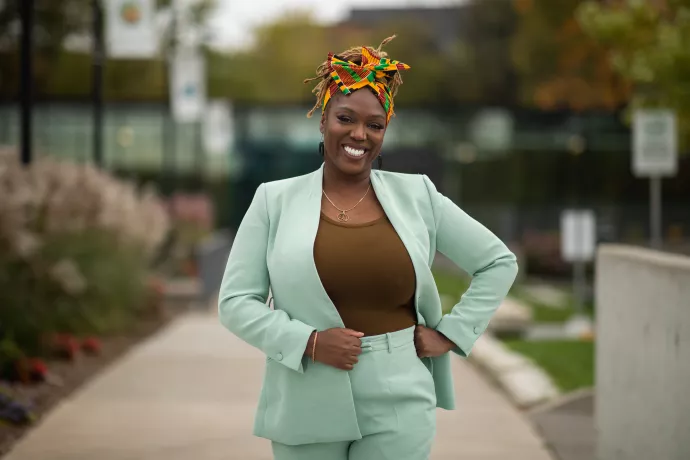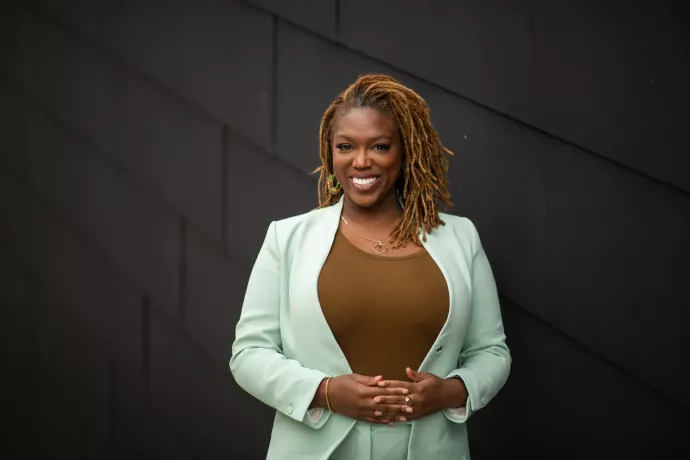UTM alumna spearheads U of T experiential learning course to focus on diversity, inclusion, and anti-racism

“I never felt like the smart kid,” Desiree Kaunda-Wint (HBA 2017) describes herself in her UTM days. A sociology graduate who had specialized in Criminology, Law & Society, she currently works as Stakeholder Management Coordinator for the City of Toronto, tasked with developing targeted vaccination strategies for Toronto’s Black community, all while running her own consultancy firm, Kaunda Consulting, through which she supports other organizations such as U of T.
But, something about her must have sparked the interest of sociology associate professor Paula Maurutto when she recommended Kaunda-Wint for the ‘Internship in Sociology, Criminology, Law and Society – SOC480.’ It was this course that ignited a passion, guiding her subsequent career after graduating from UTM in 2017. And it is the same course that has now been re-launched at UTM, under Kaunda-Wint’s vision, with a new focus on diversity, inclusion, anti-racism and community engagement.

“This experience changed my perspective on the types of opportunities available in community leadership,” Desiree Kaunda-Wint recalls her placement through this internship course with the City of Mississauga. “The internship was a chance to pop your head out of your studies and see all the opportunities that exist in the real world. I was out in the community interviewing organizations, meeting incredibly inspiring people in interesting positions. My eyes were opened to the value of my life-experiences and I gained direction.”
Experiential Learning
A 200-hours course offered for full credit, SOC480 provides internship opportunities to fourth-year students who are placed with community-based organizations, non-profit agencies providing social services, municipal social services departments, social movement organizations, courts and law enforcement – just to name a few. There are also in-class components to the course, and, at the end of the term, a symposium takes place at which students have the opportunity to showcase their experience and learnings to potential employers, faculty, fellow students, and even their families – “A fantastic way to celebrate the end of their internship and their time at U of T!” as Kaunda-Wint puts it.
The re-launch of the course under Kaunda-Wint’s guidance happened during a difficult time for her. She was working with the provincial government when, during the height of the COVID-19 pandemic, she was laid off. “It forced me to rethink everything!” Kaunda-Wint recalls.
She applied for graduate school at U of T’s Dalla Lana School of Public Health and was admitted to the Master of Public Health in Social and Behavioural Health Sciences. Through her graduate school application process, she reconnected with UTM associate professor Nathan Innocente, from whom she learned that the course, which had meant so much to her and had launched her career in the public sector, had been deferred due to the COVID-19 pandemic.
“I spent that night tossing and turning, losing sleep over the opportunities that current and future UTM students were missing out on,” Kaunda-Wint describes, “and, the next morning, I proposed to Professor Innocente to bring it back.” With Nathan Innocente’s support and initiative, the course re-launched this Fall under its new focus on diversity, inclusion, anti-racism, and community engagement, with many placement organizations focusing on diversity or working with diverse communities across the Peel region and the Greater Toronto Area. “These organizations are accepting an important challenge,” Kaunda-Wint explains, “the challenge to consider an anti-oppressive framework.”
Her role as Course Coordinator makes her crucial to the success of the students’ internships: she uses her deep knowledge of the sector and her industry connections to create outstanding placement opportunities for UTM students with organizations such as the Canadian National Institute for the Blind (CNIB), York Regional Police, Toronto Transit Commission (TTC), Black Physicians Association of Ontario, and Amadeusz. The program was also largely expanded. “We were able to secure more placements than ever before,” says Nathan Innocente, “We normally accepted 10-12 students in the course. But this year, thanks to Desiree’s outreach and the support of my department, we were able to quadruple the size of the course and find placements for 40 students.”
The in-class engagement component is a vital aspect of the course’s relaunch. Kaunda-Wint teaches one of the in-class components of the course herself. Her session, titled ‘Go Big or Go Home,’ empowers the internship participants to envision their full career potential. Nathan Innocente is looking forward to Kaunda-Wint’s lecture, “She brings a wealth of knowledge and experience to our students. She is a model for thinking big, for the value of having a vision and pursuing that vision wholeheartedly,” says Innocente. “Overall,” he adds, “her vison for the course, and her passion to support students, have helped to transform our internship course in exceptional ways.”
The course’s new focus on diversity, inclusion, and anti-racism, stemmed from Kaunda-Wint’s own experience and belief that the learning around these topics, that happens at the university, needs to be supported by the opportunity to tackle, grapple with, and digest real-life issues. “If it’s something you learn about in classes, but never really encounter first-hand, a disconnect is inevitable,” Kaunda-Wint says, “It’s important to fill this gap when it comes to understanding anti-racism initiatives.”
Small pushes toward equity
Kaunda-Wint’s own path to UTM was a winding one. Coming in as a mature student through adverse circumstances, she already held diplomas in American Sign Language and Police Foundations, and already had significant work experience. As a student, she was not very involved in campus life and extra-curricular activities. “Initially, it was just about passing for me,” Kaunda-Wint recalls, “until this internship opened my eyes to all the amazing career possibilities out there, creating a sense of excitement and ambition.”
Growing up in Pickering and Ajax, outside Toronto, Desiree Kaunda-Wint had to change elementary schools six times. Through early childhood hardships, she faced a great deal of isolation and discrimination in a very homogeneously white area, and she continued to have little family support throughout her school days and education.
“I experienced first-hand the challenges of acute mental health concerns” Kaunda-Wint says, painfully recalling the ordeal of finding her father the day after Christmas 2015, during her second year at UTM. He had been on the ground for three days after having suffered a brain aneurysm and a stroke before Kaunda-Wint found him, saving his life just in time. Over the next year she sought help through therapy, not only trying to process this trauma, but also her strained family relationships, when, almost exactly a year later, her therapist tragically and unexpectedly passed away.
“At that point, my goal to complete my education was all I had!” she remembers. Making it through university continued to be a struggle, but things changed for Kaunda-Wint when Professor Maurutto pushed her to apply for the internship program.
“When we think of equity and helping those in need, it’s often about those who have it worst,” Kaunda-Wint explains, “but, for me, it’s a lot about the kids, the students, that are just getting by, are doing ok, but just need that little push to succeed.” That’s what Paula Maurutto’s encouragement and mentorship meant to her success and that’s how Kaunda-Wint embeds equity in the newly-revised internship course she co-coordinates.

With her new responsibilities at the City of Toronto, her own consultancy firm, and her course coordinator work at U of T, Desiree Kaunda-Wint currently has her plate full and has decided to defer her graduate school start date with Dalla Lana School of Public Health – at least for now. She has no regrets; the first cohort of forty internship students have started their placements and incredibly rewarding stories are starting to trickle in.
“The relaunch and new focus of the class means the world to me!” Kaunda-Wint says; and her enthusiasm shows in the incredible amount of time and effort she has put into finding promising students, fantastic placement opportunities, and matching them the best way possible.
“Ultimately, I want the class to touch people’s hearts,” Kaunda-Wint explains, “I want students to feel seen and I want them to end their time at university with something big!”



